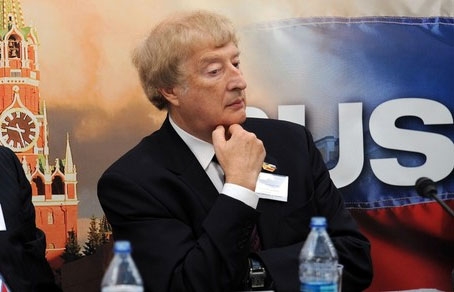
 The top agenda items during Secretary of State John Kerry’s talks with President Vladimir Putin and his Russian counterpart, Foreign Minister Sergei Lavrov, were Ukraine and Syria. But getting Washington and Moscow on the same page is a daunting if not impossible task given the fundamental differences between U.S. and Russian policies.
The top agenda items during Secretary of State John Kerry’s talks with President Vladimir Putin and his Russian counterpart, Foreign Minister Sergei Lavrov, were Ukraine and Syria. But getting Washington and Moscow on the same page is a daunting if not impossible task given the fundamental differences between U.S. and Russian policies.
 The top agenda items during Secretary of State John Kerry’s talks with President Vladimir Putin and his Russian counterpart, Foreign Minister Sergei Lavrov, were Ukraine and Syria. But getting Washington and Moscow on the same page is a daunting if not impossible task given the fundamental differences between U.S. and Russian policies.
The top agenda items during Secretary of State John Kerry’s talks with President Vladimir Putin and his Russian counterpart, Foreign Minister Sergei Lavrov, were Ukraine and Syria. But getting Washington and Moscow on the same page is a daunting if not impossible task given the fundamental differences between U.S. and Russian policies.
The contours of any possible deal on Ukraine are unclear. Kiev has failed to pass legislation necessary for local elections in the Donbass, which was supposed to have happened by the end of last year under the Minsk II agreement. The breakaway Donetsk and Lugansk republics, whose independence Moscow has declined to accept, reportedly are planning "primary elections” as a way to try to force Kiev’s hand. Nobody thinks that will work, as Ukraine spirals toward failed state status, now possibly the poorest country in Europe.
Agreement on Syria should be easier to achieve since both Washington and Moscow share the view that the Islamic State must be destroyed. They believe the same about the al-Nusra Front, the local arm of al-Qaeda. The problem is so-called "moderate” jihadist groups armed, trained, and financed by Washington to eventually overthrow Syrian President Bashar al-Assad but who also at times join forces with al-Qaeda and ISIS, with whom they share a Wahhabis ideology.
Therefore, any deal is looking less likely as Moscow is infuriated with U.S. efforts to shield what the Russians see as terrorist groups. Faced with the collapse of Obama’s policy, the question is whether Kerry was in Moscow to negotiate a "soft landing,” under which the U.S. walks away from these problematic "assets” and moves to wind down the war while Assad remains in power.
That will be a hard sell for some in Washington even if Kerry himself supports it, which is uncertain. Said one unnamed U.S. official, "The president has said that Assad has got to go, and our allies, especially the Saudis, hold that view very strongly. In fact, they keep asking us why we’re cozying up to Moscow … it isn’t clear why the secretary of state thinks he can enlist the Russians to support the administration’s goals in Syria.”
Under a lame duck president the opposition to the White House can now be traced within the Pentagon, the CIA, and even Kerry’s own State Department. According to investigative journalist Gareth Porter, the so-called "dissent cable” by 51 American diplomats had been clearly designed to be leaked and was a put-up job from elements close to Hillary Clinton and her shadow Secretary of Defense, Michele Flournoy.
When all is said and done it is still not clear that Kerry, much less Obama, is ready to jettison their priority of thwarting Moscow by subverting Syria rather than achieving their ballyhooed goal of destroying ISIS. If defeating the Islamic State really were the desired outcome, the pieces are in place for an advance on Aleppo, Raqqa, and Mosul by the Syrian Army, the Kurds, and the Iraqi Army, backed by massive American and Russian air support.
Adding in the recent turmoil in Turkey and Ankara’s efforts to patch up ties with Russia and Israel, President Erdogan may now have an incentive to break with Saudi Arabia and Qatar and help wind the war down.
It’s decision time. With the jihadists spreading their reach ever wider, the American people must make up their minds and send the right message to the White House. It’s past time that U.S. foreign policy served the interests of Americans, not those of neocons and theocratic Sheikhs.
Edward Lozansky is president of the American University in Moscow, Professor of Moscow Sate and National Research Nuclear Universities



.jpg/250px-ElbeDay1945_(NARA_ww2-121).jpg)





